Iran International First Persian Language Broadcaster Reporting From Gaza
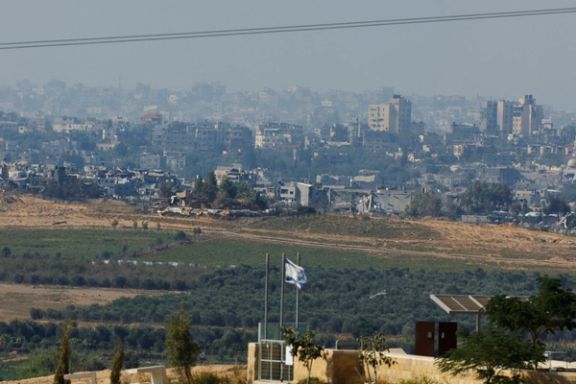
Iran International, the 24-hour news television channel broadcasting to Iran on satellite, was given entry into Gaza as the first Persian-language media.

Iran International, the 24-hour news television channel broadcasting to Iran on satellite, was given entry into Gaza as the first Persian-language media.
The Israeli army permitted Iran International to visit Gaza and report on the developments of the Israel-Hamas war. The Israel Defense Forces (IDF) say that they have gained control over Gaza, but our correspondent heard sounds of gunfire, with Hamas forces said to be attacking from underground tunnels.
The Iran International news team entered Gaza in an Israeli military vehicle from the vicinity of a Kibbutz in southwestern Israel, which had witnessed the terror attack by Hamas on October 7th. This is the same route that Hamas militants used to enter the Kibbutz (Erez) and terrorize Israeli civilians.
Along the way, Israeli-plated vehicles, brought to Gaza by Hamas forces, can still be seen on the side of the road, the Iran International team reported. A black smoke covers the distance of Gaza city, and the sound of explosions continues incessantly.
An Israeli soldier told Iran International that although Gaza City is under the control of the army, the clearing operation is still ongoing, and sometimes Hamas militants open fire towards Israeli soldiers from their underground tunnels.
According to an Iran International correspondent, tens of thousands of residents from northern Gaza are moving towards the south of the Strip carrying white flags. Israeli forces are monitoring evacuations to prevent Hamas militants from stopping the process.
The report says that the extent of the war's devastation in northern Gaza is so severe that there is no place for life in this area, and it can be said that Gaza City has been destroyed.
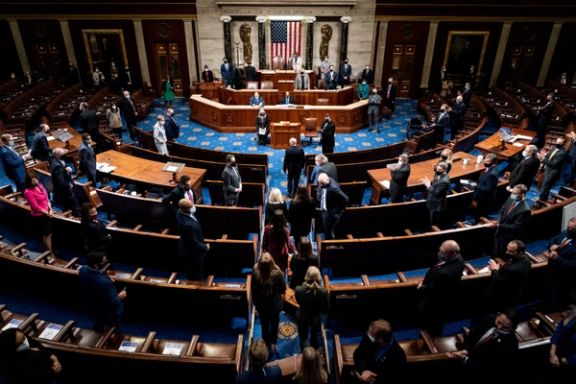
US lawmakers are introducing several measures to compel the Biden administration to adopt a more assertive stance towards Iran, including the possibility of a direct attack on Iranian soil.
Many in the Congress are dismayed by a new US sanction waiver that would see Iran gaining access to another $10 billion frozen in Iraq, while openly backing Hamas and celebrating its attack on Israel last month.
“We are in a day and age where we need to be aggressive with Iran,” Senator Joni Ernst told Iran International’s Arash Alaei. “If you look at what is going on in the Middle East right now, we see Iran sponsoring terrorism through Hezbollah, Hamas and the Palestinian Islamic Jihad.”
Senator Ernst is co-sponsoring a bill with Senator Richard Blumenthal that aims to enforce Iran’s oil sanctions –abandoned by the Biden administration in all but name.
The bipartisan bill includes a provision for a $150 million sanctions enforcement fund that would allow the Department of Homeland Security Investigations office to focus on enforcing Iranian oil sanctions.
“We need to start interdicting Iranian oil and use the funds for victims of state-sponsored terrorism”, Senator Ernst told Iran International.
Another initiative, introduced by Senators Lindsey Graham and Richard Blumenthal urges President Biden to attack Iran in case an American soldier was killed in Syria or Iraq.
“If an American is killed… then the target should be in Iran,” said Senator Graham at the press briefing introducing the initiative. “We’ve had four strikes, all inside Syria… Reagan hit Iran. Trump hit Iran… they need to pay a price they haven’t paid yet.”
And he explained the “price” in the clearest terms.
“That price should be the IRGC infrastructure… and the oil refineries should be knocked out if they continue their efforts to expand this war [between Israel and Hamas].”
Senators Graham and Blumenthal say that their draft is such that it would require no further Congressional authorization and President Joe Biden can take action at will.
“And the Iranians will get it,” Senator Blumenthal said at the same briefing. “And hopefully they’ll get it today, even before it’s passed, that we stand behind the President. We don’t want war. They shouldn’t want war.”
Iran and the US have been on a colliding course for a few weeks now, but so far have avoided direct conflict. The Islamic Republic utilizes its proxies in Iraq and Syria, as well as Houthis in Yemen and Hezbollah in Lebanon to attack US and Israeli targets. The United States, on the other hand, has retaliated by striking at IRGC affiliated facilities in Syria.
Senator Graham called for a direct and clear warning to be issued to Iran.
“So if you continue [the attacks], this is what’s coming your way,” he said, “we’re going to hit you hard in every sphere of influence, economic and military. We are on the edge right now. The Iranians can make some decision one way or the other. Choose wisely.”
Despite their persistence on shifting the Biden administration's approach towards Iran, the US lawmakers are not too optimistic about their chances.
Senator Ernst told Iran International that she felt Biden was not likely to enforce the bill even if it reached the final stage and was signed into law.
“I don't count much on the Biden administration,” she said, “I'm hopeful that in the next few years, we have a different leader that will be willing to enforce the sanctions.”
Many believe that the Biden administration has chosen to look the other way and allow Iran to export its oil in spite of the sanctions –hoping that in return, it would get the regime to agree to some kind of nuclear deal.
On Wednesday, a White House Energy Adviser Amos Hochstein said that the US will toughen up on Iran oil sanctions to curb the Islamic Republic’s revenues.
“We are going to enforce the sanctions,” he said, “those numbers will come down.”
Iran reportedly exported 1.4 million barrels of oil per day last month. This is almost twice as much as it averaged during Trump’s “maximum pressure” campaign, according to United Against Nuclear Iran.
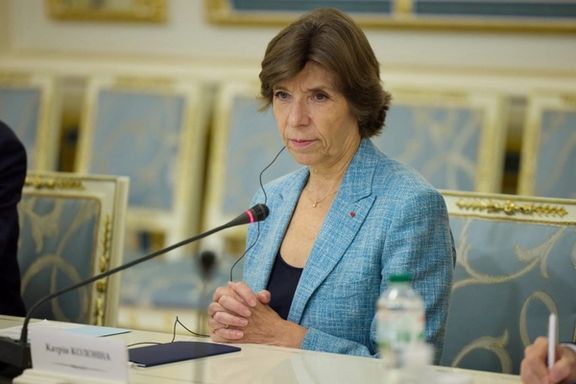
France's foreign minister said she had told her Iranian counterpart on Thursday that Tehran would bear a heavy responsibility if the conflict in Gaza spreads across the region.
"Meeting today with my Iranian counterpart in the form of a warning: the extension of the current conflict in Gaza would not benefit anyone, and Iran would have a heavy responsibility," Catherine Colonna said after a face-to-face meeting in Geneva with Hossein Amir-Abdollahian.
The conversation was the latest between French and Iranian officials as Paris looks in particular to defuse tensions between Israel and Iran-backed Hezbollah.
The United States has also reportedly asked Chinese President Xi Jinping to use his influence to persuade Iran not to engage in escalation. Iranian-backed militias in the region have launched more than 50 drone and rocket attacks against US troops stationed in Iraq and Syria since the October 7 attack on Israel. The US military has retaliated by launching three air strikes against Iran's Revolutionary Guard targets in eastern Syria.
Ties between France and Iran have also been strained in recent months over what Paris has said are arbitrary arrests of four of its citizens that it says are equivalent to state hostage taking.
"The minister finally called for the immediate release of the four French nationals still arbitrarily detained in Iran and whose situation is extremely worrying," the foreign ministry said in a separate readout of the meeting.
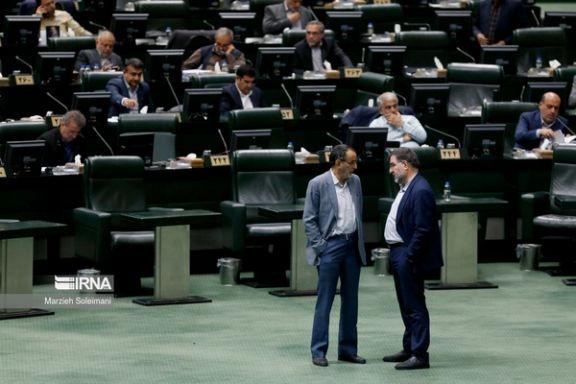
Concerns over a breach of Iranians’ privacy are growing as hardliners in the government defend a recent legislation to monitor peoples’ lifestyles online.
The controversial legislation, a clause of Article 75 of the Seventh Development Plan, mandates the Ministry of Islamic Guidance to launch a database consisting of information collected from online activities of individuals for "continuous monitoring and evaluation of cultural indicators, people’s lifestyles, media influence, and communications."
The legislation also requires government agencies and all domestic websites and platforms, including online businesses, to continuously feed their user information to the database.
Media and individuals on social media have extensively criticized the legislation that the parliament approved on November 8 but has yet to be endorsed by the constitutional watchdog, the Guardian Council.
Detractors, including legal experts, express concerns over the lack of assurance regarding the safety of individuals' sensitive personal information, despite a reference to Article 25 of the Iranian Constitution in the legislation. Article 25 explicitly prohibits the government from engaging in spying on citizens' private communications, “unless when required by law.”
Critics argue that this provision would empower any judge to override individuals' right to privacy whenever authorities, including security forces, decide to obtain private information and data derived from an individual's online activities across various platforms. This encompasses information related to travel and transportation, as well as online searches and downloads.
An earlier version of the proposed legislation explicitly outlined that the collected data would be utilized by authorities to "consolidate the Islamic-Iranian lifestyle," aiming to ensure that people's lifestyles align with the perceived Islamic standards of the regime.
In an interview with Ham-Mihan newspaper, Ali Yazdikhah, the deputy chairman of the parliament’s cultural committee, insisted that only "macro-data" would be stored in the database, emphasizing that it would not include information on individual citizens' lives and lifestyles. However, he acknowledged that data inputted into the system, such as individuals' interests or participation in religious ceremonies like Ashura, could be utilized to assess the general interest "in [Islamic] values and sanctities."
Several critics, including lawmaker Moeeneddin Saeedi, who opposes the bill, argue that the more the state engages in cultural engineering, the greater resistance it will encounter from the public. Saeedi stated, "Experience has proven that we have failed to advance indicators of culture with these [engineering] methods," he said during the debate on the parliament floor.

As an example, Saeedi pointed out that the current year's budget law stipulates that mosques conducting prayer congregations twice daily should receive financial incentives. However, he contended that the effectiveness of such measures in encouraging regular prayer is questionable, as over 75 percent of mosques in the country remain inactive due to insufficient attendance, despite the authorities' efforts to revitalize them.
Renowned journalist and social researcher Abbas Abdi told Ham-Mihan newspaper that the gathering of data for social research, if indeed the intended purpose of launching a database, is not inherently new or objectionable. However, he argued that government agencies lack the competence to carry out reliable research projects, and they are neither genuinely interested in nor adequately prepared to discover people's preferences or to publish research results to public.
He highlighted that authorities routinely withhold statistics on sensitive topics, including relationships between men and women, alcohol consumption, addiction, birth rates, age of marriage, and suicide.
“Suppose that they conduct research [based on the data available in the database] about dress code [=hijab], … They can’t publish the results because they are afraid people’s views and beliefs [will be known],” he said.
“However, if they intend to monitor people’s private lives and gather personal information, this would only be for the purpose of controlling and intimidating the public,” he added.
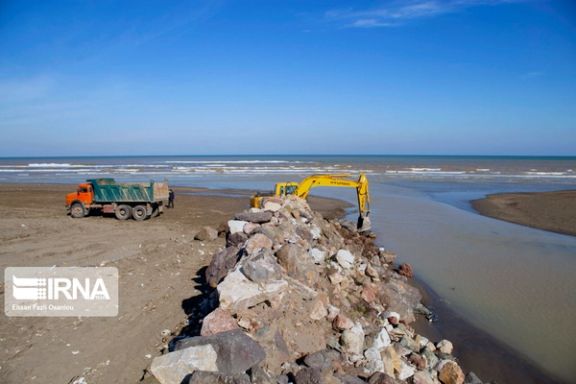
Ahmad Tavakoli, the head of the Civil Coordination in Mazandaran Province, has warned about a significant decline in the Caspian Sea water level, dropping by about four meters since the 1970s.
Tavakoli attributed the change in the world's largest lake to “substantial precipitation and the annual water flow", Iran recently blaming Russia for the crisis, emphasizing the closure of vital entrances, especially the Volga River.
Ali Salajegheh, the head of the Iranian Department of Environment, said the ecological challenge posed by the situation reveals a reduction of approximately one meter over the past 4-5 years, with an average annual recession of 20 centimeters.
His rare criticism against Russia, one of Iran's strongest allies, raised concerns about the ecological impact of dams constructed on the Volga River and the potential damage to delicate ecosystems relying on the Caspian Sea's waters
According to the Central Asia-Caucasus Analyst, it says: "This will have significant and serious implications, including a decline of the sea water level, a considerable retreat of the sea and increase of the land and coastal area especially in upstream countries (Russia and Kazakhstan), challenges to the operation of ports and shipping, as well as environmental consequences, particularly the drying of protected areas and wetlands."
It warned that the water level of the Caspian Sea has decreased by one meter in recent years and could drop by 9 to 18 meters by the end of the 21st century.
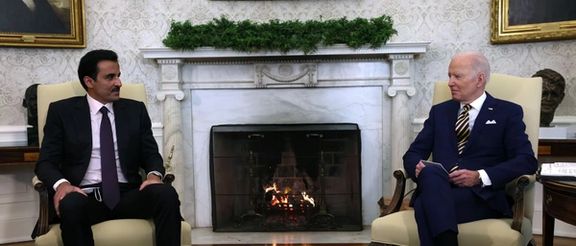
The world is well aware of Qatar’s critical mediating role for the release of Israeli and foreign hostages taken by Hamas during its October 7 attack on Israel.
President Biden and the Qatari emir spoke over the phone on November 12 about Qatar’s mediation with Hamas and Biden thanked the emir for his intervention on behalf of the hostages. The phone call took place just after the November 11 joint Arab League-Islamic (OIC) Conference summit in Riyadh.
The summit, a display of Arab and Islamic fraternity, nonetheless, seemed to have achieved little practical outcome. A year ago, no one foresaw that Arab leaders would welcome two “rogue” (per the common parlance of the US foreign policy apparatus) actors into their midst: Iran (Raisi) and Syria (Assad), aka the Axis of Resistance, along with Qatar’s Sheikh Tamim bin Hamad. In fact, between 2017 and 2021, the Saudis and the Gulf Cooperation Council (GCC) treated Qatar, a founding member of the club, like a “renegade.”
Arguably, Hamas’ 7 October attack and the abduction of Israeli and foreign national hostages, was the historic event that placed Qatar’s sovereign prince, Tamim bin Hamad on par with Muhammad Bin Salman (MBS) of Saudi Arabia at the Riyadh summit and underscored the key role that they both play at this critical juncture.
Qatar’s participation at the Riyadh summit raised hopes that the Arab leaders would be able to set a practical path forward about the Israel-Gaza war. The last time that Arab leaders arrived at such a practical consensus was at the 2002 Beirut Summit when they set up a comprehensive “agenda for peace” in the Middle East. ‘The Arab Peace Initiative’ called for the implementation of UNSCR 242, offered a rather nuanced revision of the Oslo Accord, reiterated its commitment for a two-state solution, and called for normalization of relations with Israel.
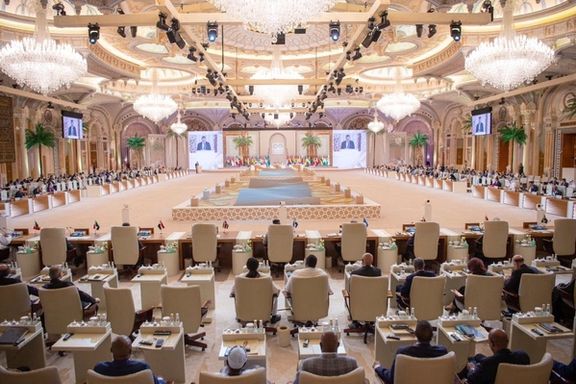
In 2002, Qatar was a collegial member of a cohort that wished to set out on a productive path in the ever-stalling Israeli-Palestinian Peace Process. Two decades later, Qatar exalts in a diplomatic purgatory between anti-Israel, ultra-right Islamist “rogue” actors like Hamas and the Taliban, and the rest of the world. Qatar’s evolving foreign policy has thus broken with the standards of Arab conservative monarchies’ statecraft.
Qatar’s wish to be a master of its own house and commander of its own fate is no secret. Since the mid-1990s that emir Tamim’s father, emir Hamad, took control of the small monarchy in a coup, scholars and experts have been grappling to make sense of the many “contradictory” paths that Qatar has been taking. Some even called Qatar a major player in an emerging Arab Cold War.
Despite all the ups and downs in Qatar’s foreign policy, the year 2015 was a pivotal year. With the civil war unraveling Syria and Libya, Qatar proactively aligned itself with Turkey’s Erdogan and sought to consolidate her place as a patron of Hamas. Qatar’s ability to assert itself could not have happened without its growing status as a contender in global energy security that controls about fourteen percent of global natural gas reserves. This newly found independence as an energy superpower may have to do with its increasingly assertive tone vis-à-vis Saudi Arabia and the GCC.
Research and commentary on Qatar’s rise and its “contradictory” foreign policy paths has been confusing and contradictory. Indeed, Qatar studies’ enterprise uncannily resemble the making-sense-of-Iran industry in DC’s beltway. Notwithstanding concerns that Qatar and other Gulf countries could be influencing research on their foreign policy through generous donations to US universities, two camps have risen to explain and critique the evolution of Qatar’s foreign policy over the past twenty years.
The first school argues that Qatar’s eccentric foreign policy diplomacy should be understood in the wake of several transformational shifts that revolutionized the region’s power dynamics between 1992 and 2010: Iraq’s invasion of Kuwait and its eventual expulsion, the fall of Saddam as a result of the 2003 US invasion, and the Arab Spring. Since 1990, they argue, Qatar has endeavoured to achieve a status equal to that of Saudi Arabia. Qatar apologists cite its indispensability to any future Middle East Peace considering the Israel-Hamas conflict.

Qatar critics consider Qatar’s regional influence, acknowledge its domestic challenges and insecurities, and point out its regional and transnational aspirations. They cite Qatar’s catalogue of nonconformities as evidence of a state seeking hegemony through collusion with a rogue regional state (Iran) and the patron of non-state actors (Hamas and Hezbollah), as well as Libyan and Syrian armed factions.
Qatar has slowly pivoted toward, in order of importance, the US, Iran, Turkey, and has sought to be the patron of Hamas, the Taliban, and several armed Sunni Islamist factions in Syria and Libya. Despite Qatar’s opposition to Assad’s regime, its very rivalry with Saudi Arabia has brought it closer to Iran that is at once Hamas’ other patron and Saudi Arabia’s rival in the region.
This is not a policy of keeping “your friends close” and “your enemies closer.” Qatar’s national security doctrine seems to hinge on one pivot: to elevate Qatar into a global middle power above the fray of an ever volatile interplay between Qatar’s neighbours and their regional adversaries. Meanwhile, Qatar declares itself the friend of everyone, taking for granted the good graces of the US, its chief geostrategic and security ally.
Such a stance indeed allowed Qatar to play an important role as a mediator between various parties and ostensibly as a “devil’s advocate.” Qatar hosted the US-Taliban negotiations between, first, Trump, and, then Biden’s administrations in Doha. As a result, the Biden administration’s rushed and disastrous withdrawal from Afghanistan and the fall of the country back the Taliban. Qatar played a similar mediating, “Devil’s’ advocate” role between the Mullahs of Iran and the Biden administration in the case of the release of US dual nationals from Iranian prisons. During those negotiations the US allowed South Korea to release six billion dollars of Iranian funds from its banks to be funnelled back to Iran through Qatar.
Nurturing such a comradery with “rogue” actors like Iran and Hamas has hardened Qatar’s approach towards normalization between Israel and her GCC neighbors. Qatar’s reservations against the Abraham Accords must thus been seen in light of its historical paranoia, the 2017-2021 blockade, and the Kuwait War syndrome combined. The events of 7 October and their aftermath, however, have revealed that Qatar’s unease with the Abraham Accords as well as its patronage of Hamas has more significant repercussions than that of a small state seeking global middle power status.
Whether one lambasts Qatar or accepts it as an egocentric cousin, the remedy that both schools of thought seek is the same: Qatar must be engaged to reduce risks to a resolution of the Arab Israeli conflict.
Qatar’s longstanding paranoia towards Saudi Arabia as well as its Kuwait War Syndrome fears are certainly key in determining the contours of its national security doctrine, that needs further exploration. Such a deep seated, and very well founded, sense of insecurity does dictate henceforth Qatar’s foreign policy decisions, but it could be emboldening anti-status quo actors such as Hamas, Hezbollah, and Iran. In the final analysis, Qatari foreign policy is driven by paranoia, aiming to liberate Qatar from the influence of all regional hegemonic actors in a volatile region. Drawing on John Heller's wisdom in Catch-22 ("Just because you are paranoid doesn't mean they aren't after you"), Qatar's foreign policy appears to be a "Catch-22" diplomacy, with its ultimate outcome only discernible in hindsight.